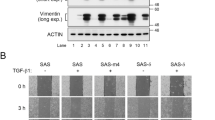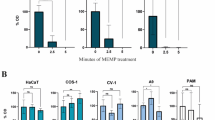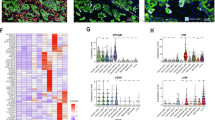Abstract
The biological mechanisms underlying cancer cell motility and invasiveness remain unclear, although it has been hypothesized that they involve some type of epithelial-mesenchymal transition (EMT). Here we show that human cancer cells express in vivo a precise multi-cancer invasion-associated gene expression signature characterized by the prominent presence of collagen COL11A1 and thrombospondin THBS2. The signature is present in the expression of all solid tumor datasets that we analyzed and includes numerous EMT markers, among them the transcription factor Slug, fibronectin, and α SMA. Using xenograft models of human cancer cells in immunocompromised mice and profiling the harvested tumors separately with species specific probes, we found that human, but not mouse, cells express most of the genes of the signature and Slug is the only upregulated EMT-inducing transcription factor. Taken together with the presence of the signature in many publicly available datasets, our results suggest that this Slug based EMT signature is produced by the cancer cells themselves in multiple cancer types, including even nonepithelial cancers such as neuroblastoma. Furthermore, we found that the presence of the signature in human xenografted cells was associated with a downregulation of adipocyte markers in the mouse tissue adjacent to the invasive tumor, suggesting contextual microenvironmental interactions when the cancer cells encounter adipocytes, as previously reported. The known and consistent gene composition of this cancer EMT signature, particularly when combined with simultaneous analysis of the adjacent microenvironment, provides unique opportunities for shedding light on the underlying mechanisms of cancer invasiveness as well as identifying potential diagnostic markers and targets for metastasis-inhibiting therapeutics.
Similar content being viewed by others
Article PDF
Author information
Authors and Affiliations
Corresponding authors
Rights and permissions
About this article
Cite this article
Kandel, J., Anastassiou, D., Rumjantseva, V. et al. Human Cancer Cells Express Slug-based Epithelial-Mesenchymal Transition Gene Signature Obtained in Vivo. Nat Prec (2011). https://doi.org/10.1038/npre.2011.6243.1
Received:
Accepted:
Published:
DOI: https://doi.org/10.1038/npre.2011.6243.1



